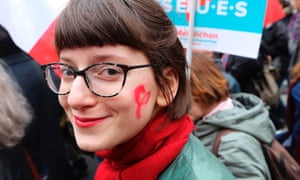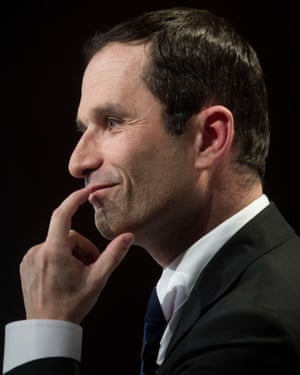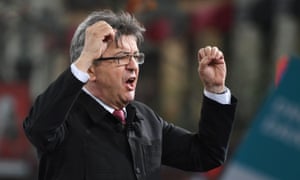The movement’s failure to unite behind one candidate will be costly

A marcher backs hard-left presidential candidate Jean-Luc Mélenchon’s La France Insoumise (Unbowed France) movement in Paris on Saturday.
Photograph: Jacques Demarthon/AFP/Getty Images
This weekend is billed as the “final round” in the battle of France’s bitterly, almost fatally, divided left.
Two big weekend rallies pit Benoît Hamon versus Jean-Luc Mélenchon: the socialist left versus the hard left, a battle that seems set to ensure that neither will win the ultimate struggle to become the country’s next leader.
Mélenchon’s La France Insoumise (Unbowed France) movement marched on the Bastille yesterday; Hamon, the Parti Socialiste (PS) candidate, will hold a rally today at the AccorHotels arena at Bercy, not far from his former office when a junior economy minister in François Hollande’s Socialist government, one he ultimately refused to support.
The timing of the two events, seen as an unfortunate coincidence rather than a deliberate provocation, comes when both candidates are struggling to be heard above the cacophony of political scandals that have nothing to do with them but have drowned out the debate.
For Hamon, it may be a last chance to breathe life into an ailing campaign after further damaging defections from his own camp.

Since Hamon won the Socialist party primary elections in January, a succession of leading Socialist ministers have thrown their weight behind rival Emmanuel Macron, who refused to take part in the PS primary process. The latest, Manuel Valls, the former prime minister and an early favourite to win the Socialist party primaries before his surprise defeat by Hamon, last week admitted that he could not support the party’s official candidate, despite previously promising to do so.
At a closed-door meeting of 300 supporters last week, Valls accused Hamon of drifting into “factionalism”. “If the left is incapable of being responsible, it will be consigned to history,” he told the audience.
Hamon’s response was immediate. “I don’t feel betrayed myself, but perhaps those who voted for me in the primaries do. To respect one’s word is important.”
Valls’s decision comes on the heels of former Paris mayor Bertrand Delanoë’s, and the defence minister Jean-Yves Le Drian’s, declarations of support for Macron as “the best hope of defeating [Marine] Le Pen”. On Hamon’s side, the current Paris mayor, Anne Hidalgo, and Socialist ministers past and present Christiane Taubira, Martine Aubry, Vincent Peillon, Arnaud Montebourg, Aurélie Filippetti and Najat Vallaud-Belkacem, as well as Jean-Christophe Cambadélis, have declared their support for the official candidate.
Hollande is publicly reserving judgment, but is believed to privately support Macron.

The PS defections have effectively divided the party in two – threatening its future, whatever the outcome of the election – and split the French left into three distinct camps represented by Hamon, Mélenchon and Macron.
Hamon’s response last week was an attempt to unite a few more Socialist comrades behind him by “enriching” his anti-austerity programme to show it was not simply idealistic but “possible” and a real alternative to the threat from the far-right Front National.
In a 38-page pamphlet, he renewed his pledge to introduce a universal income and a job-creating investment programme, but also outlined a raft of new proposals. These included promising to encourage the production of goods in France, forcing companies that move manufacturing elsewhere to repay public subsidies, and to oppose the Canada-EU Ceta and Tafta free-trade treaties.
Next week Hamon’s advisers will hold a series of “thematic briefings” to outline the programme to journalists.
Shortly before Mélenchon’s rally on Saturday, France’s Constitutional Council released the official list of 11 candidates who will take part in the first round of the presidential elections on 23 April, following the deadline for names to be registered and accepted. This is one less than for the 2012 presidential election, won by François Hollande. The two candidates who attain the most votes in the first round will go through to a second vote two weeks later.
Tomorrow, all five principal presidential candidates, the far-right Marine Le Pen, Macron, hard-right François Fillon, Hamon and Mélenchon – in order of poll popularity – will take part in a TV debate on social, economic and international issues. “We won’t be there to look for the nits in the other candidates’ hair. Benoît Hamon has presented his programme, but many French people just haven’t heard it,” Mathieu Hanotin, Hamon’s campaign director, said last week.
In the coming weeks the Bercy arena will host some of the biggest names in music, including Ed Sheeran, Deep Purple, Bruno Mars and Phil Collins. Hamon, whose campaign speeches can – and have – run to the length of a pop concert, can only hope some of the venue’s showbiz glitz will rub off today. His campaign team are willing at least 15,000 people to turn up – just a few thousand from full capacity, and say the aim will be to show that “an ambitious left can raise its head”.
“It will be a robust discourse giving his vision of the republic and of France,” Hanotin told Le Figaro, promising “an emotional moment which will make the place vibrate”.
Mélenchon was counting on as many as 100,000 supporters joining his march from Place de la Nation to Bastille. The date was chosen as a tribute to the anniversary of the start of the Commune de Paris, the radical socialist and revolutionary administration that ruled Paris for just over two months. The Commune refused to accept the authority of the French government, and was described by Karl Marx as an example of the “dictatorship of the proletariat”.
There may be nothing new about leftwingers falling out, but polls suggest uniting behind one candidate is the French left’s best hope of being in the second round of the presidential election. Remaining divided – as it seems certain it will – spells almost sure defeat.